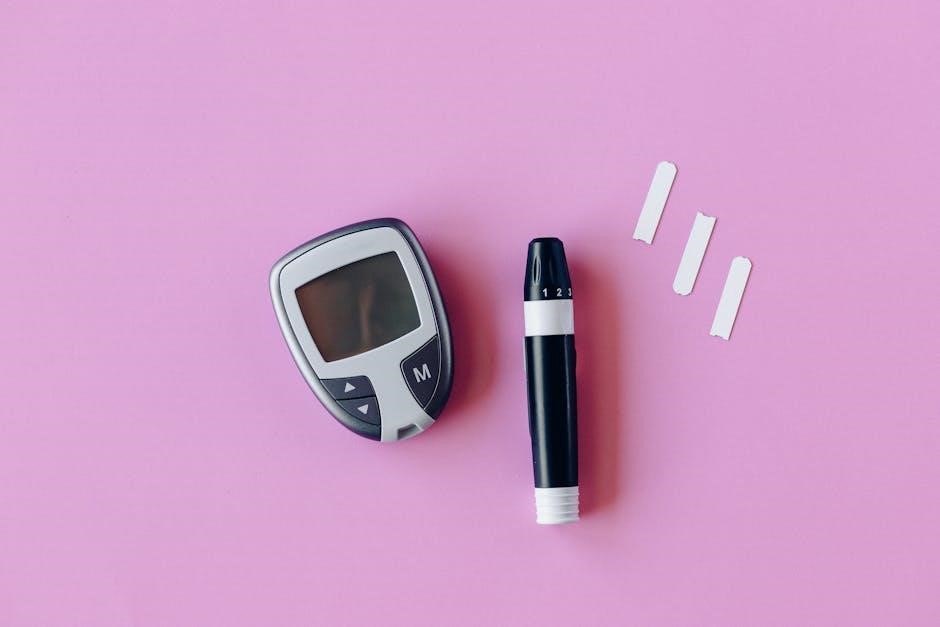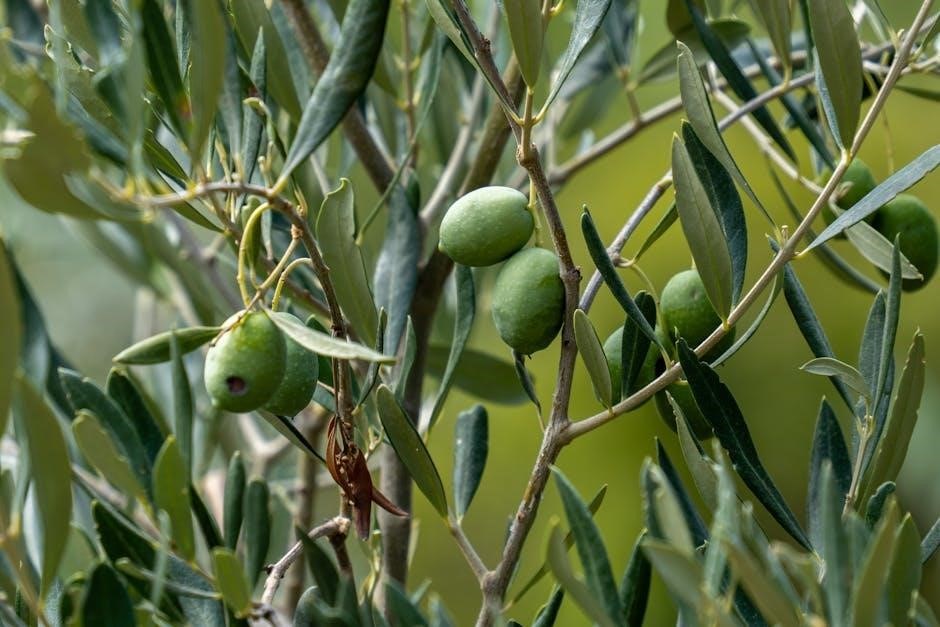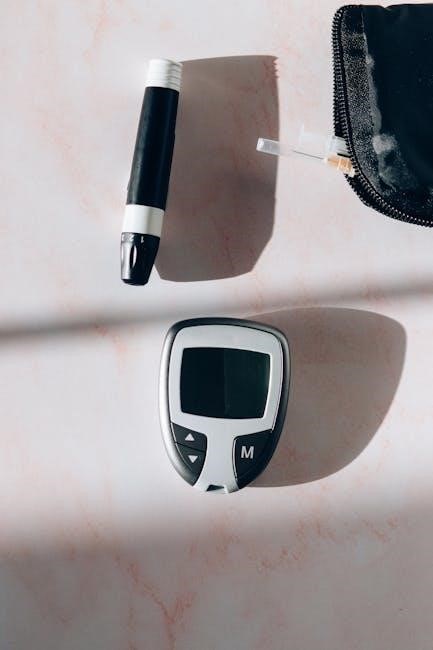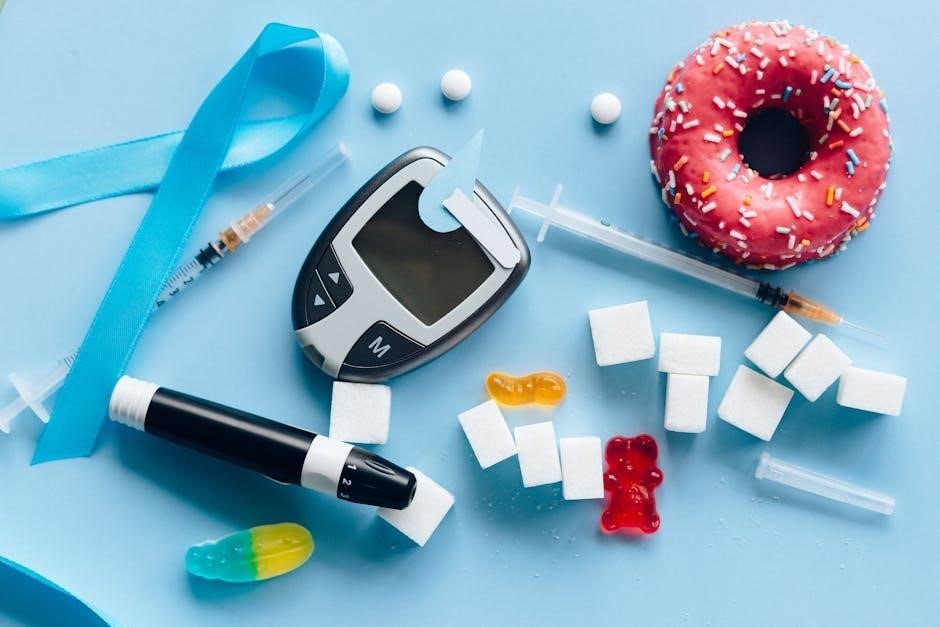This structured 21-day plan focuses on reducing liver fat and improving function through balanced nutrition. It emphasizes whole foods, healthy fats, and avoiding processed sugars to support liver health and overall well-being.
Understanding Fatty Liver Disease
Fatty liver disease occurs when excess fat accumulates in liver cells, leading to potential inflammation and damage. It is often linked to poor diet, obesity, and lack of physical activity. There are two main types: non-alcoholic fatty liver disease (NAFLD) and non-alcoholic steatohepatitis (NASH), with NASH being more severe. Symptoms may include fatigue, abdominal swelling, and nausea. Early diagnosis is crucial to prevent progression. A healthy diet and lifestyle changes are key to managing the condition and reducing liver fat.
The Importance of Diet in Managing Fatty Liver
Diet plays a crucial role in managing fatty liver disease as it directly impacts liver health. A well-structured diet helps reduce liver fat, inflammation, and prevents disease progression. Focus on whole, nutrient-rich foods like vegetables, fruits, and lean proteins. Avoid sugary drinks, processed foods, and unhealthy fats. The Mediterranean diet is often recommended for its anti-inflammatory properties. Portion control and regular meals are essential to maintain a healthy weight and support liver function. A disciplined dietary approach can significantly improve symptoms and overall well-being.
Benefits of a 21-Day Structured Diet Plan
A 21-day structured diet plan offers clarity and direction, helping individuals make informed food choices. It promotes fat reduction, improves liver function, and enhances overall health. By following a detailed meal plan, users can avoid guesswork and stay consistent, fostering healthier eating habits. The plan’s short duration makes it manageable, increasing adherence and motivation. Regular meals and balanced nutrition support weight management and energy levels, while the focus on whole foods and healthy fats aids in reducing liver inflammation. This structured approach sets the foundation for long-term healthy habits and improved well-being.

Understanding Fatty Liver Disease
Fatty liver disease involves fat accumulation in liver cells, impairing function. Understanding it is crucial for effective management through diet and lifestyle changes.
What is Fatty Liver Disease?
Fatty liver disease (FLD) is a condition characterized by excessive fat accumulation in liver cells, known as hepatic steatosis. It can be alcohol-related or non-alcoholic, often linked to obesity, diabetes, or metabolic syndrome. While early stages are often asymptomatic, advanced cases may cause abdominal swelling, fatigue, or liver damage. FLD is reversible with lifestyle changes, including diet modifications, weight loss, and avoiding alcohol. Early intervention is crucial to prevent progression to more severe liver conditions, such as steatohepatitis or cirrhosis.
Types of Fatty Liver Disease
Fatty liver disease is primarily categorized into two types: alcoholic fatty liver disease (AFLD) and non-alcoholic fatty liver disease (NAFLD). AFLD occurs due to heavy alcohol consumption, while NAFLD is linked to obesity, insulin resistance, or metabolic syndrome. NAFLD can progress to non-alcoholic steatohepatitis (NASH), characterized by inflammation and damage. Both types can further develop into fibrosis or cirrhosis if untreated. Understanding the distinction is crucial for tailoring treatment and lifestyle changes, especially within a structured diet plan like the 21-day program.
Causes and Risk Factors
Fatty liver disease often results from a combination of lifestyle and metabolic factors. Key risk factors include obesity, insulin resistance, and metabolic syndrome. Excessive alcohol consumption is a primary cause of alcoholic fatty liver disease, while non-alcoholic cases are linked to poor diet, lack of exercise, and genetic predisposition. High intake of sugary or processed foods can also contribute. A sedentary lifestyle exacerbates these risks. Managing these factors is crucial for preventing progression and improving liver health, especially within the structured 21-day diet plan.
Symptoms and Diagnosis
Fatty liver disease often has no noticeable symptoms in its early stages. However, as it progresses, individuals may experience fatigue, abdominal swelling, or pain in the upper right abdomen. Nausea and weight loss can also occur. Some people may not exhibit symptoms but still have liver damage. Diagnosis typically involves physical exams, medical history reviews, and imaging tests like ultrasound. Blood tests assess liver function, and in some cases, a liver biopsy may be necessary. Early diagnosis is crucial for implementing effective treatment plans, such as the 21-day diet plan, to prevent complications.

Dietary Principles for a Healthy Liver
A liver-friendly diet focuses on whole foods, healthy fats, and hydration. Avoid processed foods, alcohol, and excess sugar. Portion control and balanced meals support liver function effectively.
Key Components of a Liver-Friendly Diet
A liver-friendly diet emphasizes lean proteins, whole grains, and vibrant fruits and vegetables. Healthy fats, such as avocados and olive oil, support liver function without causing fat accumulation. Antioxidant-rich foods like berries and leafy greens help reduce inflammation and protect liver cells. Avoiding alcohol, sugary drinks, and processed foods is crucial. Incorporating foods high in fiber aids detoxification, while staying hydrated supports metabolic processes. Balanced nutrition ensures the liver can regenerate and function optimally, reducing the risk of further damage.
The Role of the Mediterranean Diet
The Mediterranean Diet plays a significant role in supporting liver health by focusing on whole, nutrient-dense foods. It emphasizes fruits, vegetables, whole grains, nuts, seeds, and healthy fats like olive oil, while limiting red meat and processed foods. This dietary pattern is rich in antioxidants, fiber, and omega-3 fatty acids, which help reduce liver inflammation and fat accumulation. By adopting Mediterranean principles, individuals can create a balanced and sustainable eating plan that promotes liver detoxification and overall well-being, making it an ideal foundation for a 21-day fatty liver diet.
Importance of Whole Foods
Whole foods are essential for liver health as they provide natural nutrients, fiber, and antioxidants. Unlike processed foods, they are free from harmful additives and sugars, which can exacerbate fatty liver. Incorporating whole foods like vegetables, lean proteins, and whole grains helps reduce liver fat accumulation and inflammation. These foods support detoxification processes, promote balanced blood sugar levels, and aid in weight management, all of which are critical for managing fatty liver disease effectively. Prioritizing whole foods ensures a nutrient-dense diet that supports overall liver function and well-being.
Healthy Fats and Their Benefits
Healthy fats, such as monounsaturated and polyunsaturated fats, play a crucial role in managing fatty liver disease. They reduce inflammation, improve cholesterol levels, and support liver function. Sources include avocados, nuts, seeds, olive oil, and fatty fish like salmon. These fats also aid in the absorption of fat-soluble vitamins, which are essential for liver health. Incorporating them in moderation helps balance the diet and supports overall well-being without contributing to liver fat accumulation.
Foods to Avoid for Liver Health
To support liver health, it’s essential to avoid processed foods, sugary beverages, alcohol, and fried foods high in saturated fats. These can increase liver inflammation and fat accumulation. Limit foods with added sugars, refined carbohydrates, and excessive sodium. Avoid trans fats found in processed snacks and fast food. Red meat and high-fat dairy should be consumed in moderation. Alcohol is particularly harmful, as it directly damages liver cells. Eliminating these foods helps reduce liver strain and promotes healing during the 21-day diet plan.
Hydration and Its Impact on Liver Function
Proper hydration is vital for liver health, as water aids in detoxification and fat metabolism. Drinking adequate water helps the liver flush out toxins and maintain its functional efficiency. Aim for at least 8-10 glasses of water daily, and consider incorporating herbal teas or water-rich foods like cucumbers and celery. Dehydration can impair liver function, leading to poor digestion and increased fat accumulation. Staying hydrated supports overall liver health and enhances the effectiveness of the 21-day diet plan in managing fatty liver disease.
Portion Control and Meal Frequency
Portion control is essential to avoid overeating and promote weight management, which is critical for fatty liver health. Eating smaller, balanced meals throughout the day can help regulate blood sugar and reduce liver strain. Aim for 4-6 meals, including snacks, to maintain metabolism and energy levels. Use measuring tools or food scales to gauge portions accurately. Avoid eating straight from packages to prevent overconsumption. Balancing protein, healthy fats, and complex carbs in each meal supports liver function and overall well-being.

21-Day Meal Plan Overview
A 21-day structured plan introduces liver-friendly foods, ensures balanced nutrition, and guides progressive adjustments for sustainable weight and liver health management.
This phase focuses on detoxifying the liver by introducing foods rich in antioxidants, fiber, and essential nutrients. Emphasize leafy greens, berries, lean proteins, and whole grains to support liver function. Avoid processed foods, alcohol, and excessive sugar. Incorporate healthy fats like avocado and olive oil to aid digestion and reduce inflammation. Stay hydrated with herbal teas and water. Portion control is key to prevent overloading the liver. This week sets the foundation for a healthier lifestyle, promoting gradual weight loss and improved energy levels.
Day 8-14: Incorporating Variety and Balance
During this phase, expand your diet by introducing a wider variety of liver-friendly foods; Add lean proteins like fish, poultry, and legumes to boost metabolism. Include a rainbow of vegetables to enhance nutrient intake and fiber consumption. Continue avoiding alcohol, sugary drinks, and processed foods. Introduce healthy snacks like nuts and seeds to maintain energy levels. Balance meals with complex carbs, such as quinoa and brown rice, to support sustained energy. Stay hydrated and consider adding herbal teas for detoxification. This phase aims to create a sustainable eating pattern while promoting fat loss and improved digestion.

Day 15-21: Optimizing Nutrient Intake
This final phase focuses on maximizing nutrient absorption for liver health. Emphasize foods rich in antioxidants, like berries and leafy greens, to combat oxidative stress. Increase intake of omega-3 fatty acids from fatty fish to reduce inflammation. Incorporate vitamin E-rich foods, such as nuts and seeds, to support liver repair. Consider adding turmeric and ginger for anti-inflammatory benefits. Ensure adequate hydration to flush toxins and maintain digestion. Balance macronutrients to sustain energy and promote fat metabolism. This phase aims to enhance liver function and overall well-being.

Sample Meal Ideas
Sample meal ideas introduce delicious, nutritious options to support liver health. Includes breakfast options, lunch suggestions, dinner recipes, healthy snacks, and beverages to enjoy throughout the day.
Breakfast Options
Start your day with nutrient-rich breakfasts that support liver health. Options include oatmeal with berries and nuts, Greek yogurt with honey and chia seeds, or avocado toast on whole-grain bread. Smoothies made with spinach, banana, and almond milk are also excellent. Incorporate lean proteins like poached eggs or turkey bacon. These meals provide sustained energy, fiber, and healthy fats, helping to kickstart metabolism and detoxification. Stay hydrated with a glass of water or herbal tea alongside your breakfast.
Lunch Suggestions
For lunch, opt for balanced meals that promote liver health. Grilled chicken salads with mixed greens, cherry tomatoes, and olive oil dressing are ideal. Whole-grain wraps with turkey, avocado, and veggies offer sustained energy. Quinoa bowls with roasted vegetables like broccoli and bell peppers are nutrient-dense. Lentil soups with a side of whole-grain bread provide fiber and protein. Incorporate lean proteins, healthy fats, and colorful vegetables to support detoxification and energy levels. Pair meals with a glass of water or herbal tea for hydration;
Dinner Recipes
For dinner, focus on lean proteins and vibrant vegetables. Grilled salmon with steamed spinach and roasted sweet potatoes is a liver-friendly option. Stir-fries with lean ground turkey, broccoli, and bell peppers, cooked in olive oil, are nutritious. Vegetable and bean chili with quinoa provides fiber and plant-based protein. Baked chicken with asparagus and brown rice balances flavors and nutrients. These meals support liver detoxification and provide sustained energy. Pair with a glass of water or herbal tea to aid digestion and hydration.
Healthy Snack Choices
Opt for snacks rich in nutrients and fiber to support liver health. Raw vegetables like carrots, cucumbers, and bell peppers paired with hummus make a satisfying choice. Fresh fruits such as berries, citrus, or apples are excellent for detoxification. A handful of unsalted nuts like almonds or walnuts provides healthy fats and protein. Air-popped popcorn without added salt or sugar is another liver-friendly option. Avoid sugary or processed snacks, as they can worsen fatty liver. Choose snacks that promote energy balance and liver function.

Exercise and Lifestyle Changes
Incorporate regular physical activity like walking or swimming to improve insulin sensitivity. Practice stress-reducing techniques such as yoga or deep breathing. Ensure adequate sleep each night.

The Role of Physical Activity
Regular physical activity plays a crucial role in managing fatty liver disease by reducing liver fat and improving insulin sensitivity. Aim for at least 150 minutes of moderate-intensity exercise, such as brisk walking, cycling, or swimming, per week. Strength training and high-intensity interval training (HIIT) can also enhance fat burning and liver health. Exercise helps improve metabolism, reduce inflammation, and promote overall well-being, making it a key component of the 21-day fatty liver diet plan. Consistency is essential for long-term benefits.
Managing Stress for Liver Health
Chronic stress can worsen fatty liver disease by increasing cortisol levels, which promote fat storage and inflammation. Incorporating stress-reducing activities, such as yoga, meditation, or deep breathing exercises, can help mitigate this impact. Physical activity also acts as a natural stress reliever, improving mood and reducing liver strain. By managing stress, you support your liver’s ability to detoxify and function optimally, complementing the dietary changes in your 21-day plan. Consistency in stress management enhances overall well-being and liver health.
Importance of Sleep
Sleep is crucial for liver health, as it aids in detoxification and metabolic processes. Poor sleep can disrupt liver function, exacerbating fatty liver disease. Aim for 7-9 hours nightly to support liver regeneration and overall health. Establish a consistent sleep schedule and create a relaxing bedtime routine to improve sleep quality. Prioritizing sleep enhances the effectiveness of your 21-day diet plan, promoting better liver function and faster recovery.

Monitoring Progress
Track your diet adherence, weight, and symptom improvements daily. Regular blood tests and liver function assessments help gauge progress and guide adjustments to your plan effectively.
Tracking Your Diet and Symptoms
Monitoring your progress is key to the success of the 21-day fatty liver diet plan. Keep a daily journal to record meals, portion sizes, and how you feel physically. Note improvements in energy levels, digestion, or reduced bloating. Track weight changes and measurements weekly. Document any symptoms like fatigue or abdominal discomfort to identify patterns. Regularly assessing these factors helps refine your diet and ensures adherence to the plan. Consistent tracking supports accountability and motivates long-term healthy habits for liver health.
Understanding Liver Function Tests
Liver function tests (LFTs) are essential for assessing liver health. These blood tests measure enzymes like ALT and AST, bilirubin, and proteins like albumin. Elevated levels indicate liver damage or inflammation. Regular LFTs help monitor fatty liver progression and response to dietary changes. Before starting the 21-day plan, baseline tests are crucial. Repeat testing after 21 days can show improvements in liver function, validating the diet’s effectiveness. Consult a healthcare provider to interpret results and adjust the plan if needed. Tracking LFTs ensures a safe and tailored approach to liver health.

Adjusting the Plan as Needed
As you progress through the 21-day plan, adjustments may be necessary based on your body’s response; If weight loss stalls or symptoms persist, consult a healthcare provider. They may recommend modifications, such as portion sizes or food substitutions, to better suit your needs. Tracking progress and being flexible ensures the plan remains effective. Adjustments should align with your health goals and be guided by medical advice to avoid hindering liver health improvements. Tailoring the plan can enhance long-term success and overall well-being.
Congratulations on completing the 21-day fatty liver diet plan! This milestone celebrates your commitment to improving liver health. Stick to the principles for long-term benefits and vitality.
Maintaining Liver Health Beyond 21 Days
Maintaining Liver Health Beyond 21 Days
After completing the 21-day plan, focus on sustaining healthy habits. Incorporate liver-friendly foods, stay hydrated, and exercise regularly. Avoid processed sugars and alcohol. Continue meal prepping and portion control to maintain weight and liver health. Regular medical check-ups can monitor progress and prevent relapse. A long-term commitment to nutrition and lifestyle changes ensures sustained liver wellness and overall health. Celebrate small victories and stay motivated for a healthier future.
Next Steps After Completing the Plan
After finishing the 21-day diet plan, gradually reintroduce foods while monitoring your body’s response. Focus on maintaining a balanced diet rich in whole foods, lean proteins, and healthy fats. Schedule regular check-ups with your healthcare provider to monitor liver function and adjust your plan if needed. Consider consulting a nutritionist for personalized advice. Stay active, manage stress, and prioritize sleep to support long-term liver health. Celebrate your progress and use it as motivation to continue your journey toward a healthier lifestyle.
